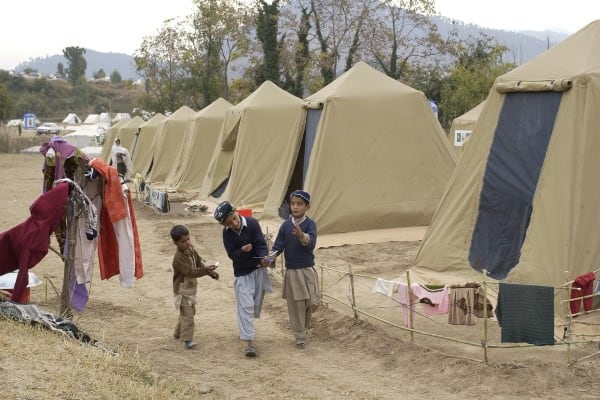This page contains affiliate links. This means if you a follow a link and make a purchase, at no additional cost to you, Humanitarian Careers will receive a commission. Thank you for supporting the site.
Being an international aid worker can be a great career. However, responding to humanitarian crises, conflicts and disasters around the world is also challenging. To become an international aid worker, it is important you get the knowledge, skills and experience the aid sector needs in the field. Knowing you must have what’s needed for the job is great, but what exactly do you need to become a humanitarian aid worker?
To become an international aid worker, you need to a degree and a level of training. You also need to gain professional skills you can bring to the field of humanitarian work, as well as be willing to travel frequently and live and work in sometimes difficult environments. Key characteristics you need to be an international aid worker include problem solving and strong teamwork.
With that said, let’s break down what you need to work in international aid…
Complete Higher Education
The first thing you need to become an international aid worker is a higher education degree. Although it is possible to enter the aid sector with an undergraduate degree, many humanitarian aid jobs require a master’s degree. You need a relevant degree to become an international aid worker because it provides you with a theoretical and practical understanding of humanitarian action. Humanitarian NGOs almost always require aid workers to have completed higher education.
To become an international aid worker, you ideally need a relevant masters degree. Great degrees to choose if you want to work in humanitarian aid include courses in humanitarian action, international development, human rights or international law. The humanitarian sector also needs aid workers qualified in support areas such as logistics, finance, HR and administration, so choosing a degree in these areas can also help you become an international aid worker.
Do Trainings
As well as having a degree you will also need to do trainings if you want to become an international aid worker. Many humanitarian NGOs provide free and charged-for trainings for people looking to become aid workers. With many trainings provided online, there are lots of trainings in humanitarian aid that are easily accessible. To become an international aid worker, you should complete trainings in the specific areas of aid work you wish to specialise in.
If you want to become an international aid worker, it is important to think about what skills you can bring to a humanitarian response. Doing trainings allows you to develop the skills needed to work in humanitarian action. To become an international aid worker, you can also build on skills you may already have, and doing training courses is a great way to learn how those skills can be used in the field of humanitarian work.
Have Professional Skills and Experience
International aid work is a demanding, high pressure and often difficult job. Responding to conflicts and crises around the world requires significant skills and experience. To become an international aid worker, you need to develop the skills needed in a humanitarian response. Humanitarian NGO’s do not deploy aid workers into disaster zones who do not have the right skills needed for the job, and so it is important to build the skills needed for humanitarian action in order to become an international aid worker.
Humanitarian responses require a wide range of roles to support the set-up and running of aid programmes. Therefore, to become an aid worker you can have skills and experience in many different areas. As well as technical roles like nutrition, health, water and sanitation and shelter, aid NGOs also need logistics, finance, HR and admin roles, as well as grants, monitoring and evaluation and management. To become an international aid worker, previous experience in any of these areas is a huge benefit.
Be Flexible
You definitely need to be flexible if you want to become an international aid worker. Crises and disaster zones are chaotic and being able to adapt your work is key to be a successful aid worker. As contexts develop and situations change, humanitarian workers need to respond quickly. This can be a challenge, especially after significant resources have been committed. Being flexible and able to make changes to your work effectively is crucial if you’re to become an international aid worker.
Another way you need to be highly flexible if you want to be an international aid worker is in your work and travel. Humanitarian workers often move between roles frequently, as different responses need different personnel. International aid workers must also be able to deploy suddenly into new and developing crises. This can make having a personal life hard at times, but if you’re able to be flexible you will have success as an international aid worker.
Humanitarian Aid Online Courses
If you are looking to work in humanitarian aid, we highly recommend the online course International Humanitarian and Development Careers. We think it provides one of the best overviews of the humanitarian sector and gives valuable insights for those searching for jobs in humanitarian aid. Follow the link to the course’s page for more information.
The International Humanitarian Law Theory and Practice online course offered by Leiden University in the Netherlands provides a fantastic theoretical overview of humanitarianism. We think it’s one of the top online courses for those who want to understand the basics of international humanitarian law. Click the link to visit the course’s page for more information.
We also think the Humanitarian Action Response and Relief online course offered by Coventry University is a must for anyone looking to become a humanitarian aid worker. It only takes around three weeks to complete and would be a major addition to the CV of anyone looking to work in the aid sector. The link is to the course’s page.
Have Determination
The humanitarian aid sector is competitive, especially at the start of your career. To become an international aid worker, you need to be determined. It’s important to understand why you want to work in humanitarian aid and what your core passions are. This will help you to navigate the aid sector and drive you through challenges in your career. Determination is key if you want to be an international aid worker.
As well as being determined in finding the right aid roles and navigating the career ladder of the humanitarian sector, international aid workers also need to be determined in their work. Humanitarian responses are difficult and can face many challenges. To be an international aid worker you need to be determined to work hard to serve people affected by crises, conflicts and poverty, regardless of the barriers that can occur.
Be Willing to Travel (A Lot)
To be an international aid worker you need to be willing to travel, a lot. Humanitarian workers deploy internationally responding to rapidly developing disasters as well as ongoing crises and conflicts. They also travel frequently between programmes as different staff are needed as different humanitarian response develop. To become an international aid worker, you need to be willing to travel frequently, often at short notice and sometimes to difficult to access places where aid is needed.
Traveling and working abroad can be fantastic and it’s one of the reasons many people want to become international aid workers. However, to work in humanitarian aid you need to commit to travel frequently often with little choice over where you go and when. Humanitarian agencies deploy aid workers as they need them and so to become an international aid worker you need to commit to moving where the aid NGOs need your skills and experience most.
Have an Understanding of Global Issues
To become an international aid worker, you need a passion and understanding for global issues. Humanitarian workers respond to crises and disasters all over the world and having a good understanding of what is happening in different regions is crucial to be successful. Most people get into humanitarian work because they have compassion for those affected by troubles around the world. This should be an important driver if you want to become an international aid worker.
It is important international aid workers have a good understanding of the places they work, the historical and political background and the root causes of the ongoing events. To become an international aid worker, you need to gain a good knowledge of the global trends causing current crises. This can be done through study, research or taking an active interest in news media and publications. It is important as an international aid worker to have some contextual understanding of global events.
Be Willing to Live and Work in (Sometimes) Difficult Places
If you want to become an international aid worker you need to be able to live and work abroad, often in difficult places. Aid workers respond to crises where they happen. This can be mean international aid workers need to be based in remote locations or areas where security risks are high. Many aid workers are also stationed in areas of conflict. To become an international aid worker, you need be willing to live and work in sometimes difficult environments.
Often international aid workers have strict security rules in the places they work. To become an international aid worker you need to be able to work effectively even with strict curfews and movement restrictions. You may also be in a remote location with basic accommodation and food and with limited internet and communications. Being able to work successfully in these conditions is an important need if you want to be an international aid worker.
Be Good at Team Working
International aid workers must operate in effective teams to deliver aid. To become a humanitarian aid worker, you need to have strong team skills and be able to work well with other people to achieve aims. Humanitarian crises are difficult, complex and challenging places to work, so being able to work well in a team in stressful environments is also important if you want to become an international aid worker.
Humanitarian NGOs deploy people with expertise from all over the world into disaster and conflict zones to work on their responses. This means international aid workers operate in highly diverse teams with people from many different cultures and background and a large mix of experiences and skills. Being able to work effectively with people from different countries and cultures is crucial to becoming an international aid worker.
Have Problem Solving Skills
Disasters and emergencies are extremely complex and humanitarian responses need to be able to operate effectively. To do this, international aid workers need to be highly skilled in solving problems, adapting how they work and finding solutions. Every humanitarian action brings its own unique challenges and aid workers need to be able to problem solve quickly and effectively in order to get aid to where it is needed most. You definitely need to be a strong problem solver to be an international aid worker.
International aid workers are deployed into crises zones and can be regularly re-deployed as their skills are needed in other responses. This means aid workers need to be able to adapt quickly to new crises, contexts and problems. Being able to land and get straight to work in difficult and changeable contexts is one of the most important skills a humanitarian worker needs. Being able to solve challenges as they arise is one of the most important things you need to become an international aid worker.
Have Strong Computer Skills
Like all modern professions, to become an international aid worker you need good IT skills. All jobs in the aid sector require you to be good at Microsoft Office programmes such as Word, Excel and Powerpoint. Excel is especially important as strong Excel skills are foundation of budget management and finances – important skills for aid workers. Word is also important for writing reports and grant applications. You definitely need good computer skills to become an international aid worker.
Some jobs within international aid require you to have an understanding of specific computer programmes. These jobs often include finance, logistics and project management roles. However, all international aid workers need to have good computer skills. This includes being able to write, present and manage data using programmes such as Word, Excel and PowerPoint. Many NGOs make job candidates sit tests as part of the interview process and so you will need good computer skills to pass and become an international aid worker.

(Maybe) Speak a Second Language
Many guides say you need to speak a foreign language to become an international aid worker. Although there are some aid sector jobs you do need a second language for, actually is it possible to become an international aid worker only speaking English. With that said, being able to speak English and either French, Spanish or Arabic will definitely help. Speaking additional languages will generally help you become an international aid worker, but it is not mandatory.
International aid workers operate all over the world, and so sometimes they need to speak additional languages. Really the language requirements for aid jobs very much depend on the role and it is definitely possible to work in the aid sector only speaking English. If you don’t speak a second language, think hard about whether dedicating the time to learning one to a professional level will benefit your career, or if your energy is better placed in trainings and other experiences.
Have a Commitment to Humanitarian Values
The final thing you must have to work as an international aid worker is a strong commitment to humanitarian values. Humanitarianism is based on a score set of ideals that are the foundation of all aid work. Being able to commit to upholding these values, even in difficult contexts, is a definite need if you want to become an international aid worker. Some of the core humanitarian values are:
- Neutrality
- Impartiality
- Independence
- Bearing witness
- Humanity
- Universality
Alongside having a strong commitment to humanitarian values, to become an international aid worker you also need to have an understanding of how humanitarian values are applied in practice. Many of these ideals are challenged in the field when humanitarian responses are implemented. Having knowledge of why these values are held, what they mean and why they are important, is crucial if you want to become an international aid worker.
If you want to learn more about how to become a humanitarian aid worker, explore out list of the top humanitarian aid online courses here.





